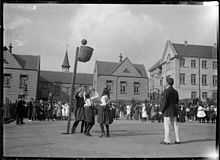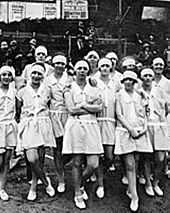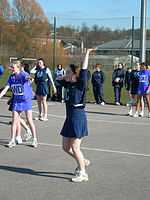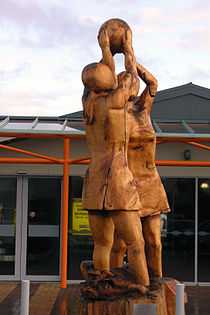Netball in New Zealand
| Netball in New Zealand | |
|---|---|
|
| |
| Country | New Zealand |
| Governing body | Netball New Zealand |
| National team | New Zealand |
| Nickname(s) | Silver Ferns |
| Registered players |
138,000 (total) (as of 2008) |
National competitions | |
| |
Club competitions | |
Netball is the most popular women's sport in New Zealand, in terms of player participation and public interest.[1] With the national team, the Silver Ferns, currently ranked second in the world, netball maintains a high profile in New Zealand. As in other netball-playing countries, netball is considered primarily a women's sport; men's and mixed teams exist at different levels, but are ancillary to women's competition.
In 2008, 138,000 players were registered with Netball New Zealand,[2] the governing body for organised netball in the country. Organised competition ranges from interschool and local club netball to premier domestic competitions such as the ANZ Championship, with the pinnacle for netball players in New Zealand being selection for the national team.
History

Netball was introduced to New Zealand as 'women's basketball' in 1906[3][4] or 1907[5][6] by Rev. J. C. Jamieson. The game spread across New Zealand through primary and secondary schools, although different playing rules emerged in different areas. By 1923, the first representative match was played between the regions of Canterbury and Wellington. The New Zealand Basketball Association was formed the following year, representing the first national governing body for netball. The first New Zealand National Tournament was held two years later in 1926. A New Zealand national team was named in 1938 to tour Australia; games were played with the Australian seven-a-side rules (cf. nine-a-side in New Zealand).[3]

Attempts to adopt an international standard of rules for netball were made in earnest in 1957 in England, along with the formation of an international netball body, the International Federation of Netball Associations. Prior to this, New Zealand and Australia had worked out their own unified rules, in places making reference to netball rules in England. New Zealand national teams played seven-a-side, while domestic teams continued to play nine-a-side. However, the new international rules of netball were agreed upon in 1958, and universally applied in New Zealand by 1961.[3] The first Netball World Championships took place in 1963 in England, with Australia defeating New Zealand in the finals.
In 1970, New Zealand became the last country to adopt the name 'netball', which until that time was still referred to as 'women's basketball'. Eventually, the New Zealand Netball Association was formed from the New Zealand Basketball Association. The 1970s saw an increase in regular tours by the New Zealand national team to other countries, as well as other national teams touring New Zealand. Domestically, mid-week netball became popular amongst housewives, who brought their children with them to netball games. By 1977, 6,058 senior teams and 2,816 primary school teams were registered with the New Zealand Netball Association.[3] New Zealand hosted the fourth Netball World Championships in 1975, coming third behind England and Australia.
In 1991, the New Zealand Netball Association changed its name to the current 'Netball New Zealand'. In 1998, the Silver Ferns won a silver medal when netball became a medal sport at the Commonwealth Games for the first time in Kuala Lumpur; a gold medal would come eight years later in Melbourne. That year also saw the formation of a revamped national netball competition, with ten new teams representing twelve regional entities (each representing one or more regions) across New Zealand, in what became known as the National Bank Cup.
New Zealand netball has enjoyed recent success in the 2000s, with the national team winning the 2003 Netball World Championships in Jamaica, gold medals in the 2006 and 2010 Commonwealth Games, as well as the first two editions of the World Netball Series. The success of the national team, combined with a long-standing rivalry with Australia, has helped the sport to maintain a high profile in New Zealand. Netball has recently developed into a semi-professional sport with the start of the ANZ Championship.
Governance
Netball New Zealand is the governing body that oversees organised netball competition at school, club, regional, national and international level in New Zealand. It was founded from the New Zealand Basketball Association, which was established in 1924, and has helped to organise standard rules of play both internationally and within New Zealand. In recent years, Netball New Zealand secured the 2007 Netball World Championships, after hosting rights were withdrawn from Fiji following the 2006 Fijian coup d'état. Netball New Zealand recently helped to organise the ANZ Championship in conjunction with Netball Australia.
Netball New Zealand oversees 12 regional netball associations in regional and regional-representative netball. In elite domestic netball, Netball New Zealand also supervises five ANZ Championship franchises, which replaced the eight National Bank Cup franchises after 2007.
Player development

Organised netball in New Zealand usually starts at local club or school level at around 5–7 years of age.[7] At this stage, players focus on learning the rules of the game, as well as ball skills and basic game play. Fully competitive netball begins at around 13 years of age, although interschool competition often starts during primary school. At this stage, young players can play for a school team or for an out-of-school club team. School teams compete against other school teams in their region, with the best four teams from each of three national 'regions' competing in the annual New Zealand Secondary School Championships. Exceptional players can be invited to participate in a development camp, from which the New Zealand Secondary Schools team is chosen.[7]
Players in out-of-school club competition compete in regional and regional-representative (national) competitions. Regional development programmes allow selected players to compete in U-15 and U-17 national competitions.[7] After this, players may trial for entry into the New Zealand U-19 and U-21 teams, which compete at the New Zealand Age Group Championships. Open-age regional competition can, for talented players, lead to competing in the New Zealand Netball Championships. Successful players can be chosen to play in a franchise in the ANZ Championship. From this point, the highest levels of netball in New Zealand are selection for the New Zealand Accelerant squad, and ultimately the New Zealand national team, the Silver Ferns.
National competitions
The first national netball competition in New Zealand was held in 1926. Presently, the three main national netball tournaments are the New Zealand National Championships, the New Zealand Age Group Championships and the New Zealand Secondary School Championships. The National Championships are contested between regional-representative teams, and provide players for the ANZ Championship franchises. U-19 and U-21 teams compete at the New Zealand Age Group Championships. The New Zealand Secondary School Championships provides players for the New Zealand Secondary Schools team. Until the late 1990s, a national club championship was also held, known as the Coca-Cola Cup.
National Bank Cup
Elite domestic netball competition emerged in 1998, when the Coca-Cola Cup was changed into a franchise-based competition, with ten new teams representing 12 regional areas. After four years, the competition was renamed the "National Bank Cup".[8] Over its ten-year run, the competition was dominated by the Southern Sting. The final season was played in 2007, with the Southern Sting winning their seventh title. It was replaced in 2008 by a new trans-Tasman competition, the ANZ Championship.
ANZ Championship
The ANZ Championship was inaugurated in April 2008 as the premier domestic netball competition in both New Zealand and Australia. The competition comprises ten teams, five each from New Zealand and Australia.
| ANZ Championship franchises | ||
| Franchise | Representative area | |
|---|---|---|
| New Zealand | Northern Mystics | Northland, Auckland-Waitakere, Counties Manukau |
| Waikato/Bay of Plenty Magic | Waikato, Bay of Plenty | |
| Central Pulse | Central North Island, Wellington, Tasman | |
| Canterbury Tactix | Canterbury | |
| Southern Steel | Otago, Southland | |
| Australia | New South Wales Swifts | New South Wales |
| Melbourne Vixens | Melbourne (Victoria) | |
| Queensland Firebirds | Queensland | |
| Adelaide Thunderbirds | Adelaide (South Australia) | |
| West Coast Fever | Western Australia | |
With the start of the ANZ Championship, netball has become a semi-professional sport in both New Zealand and Australia. For the 2008 season, each New Zealand franchise agreed to spend NZ$300,000 on player retainers, with a $12,000 minimum retainer for each player;[9] high-profile players are expected to earn up to $50,000 during the competition.[10] The ANZ Championship is predicted to raise the status of netball to a fully professional sport in both countries within several years.[10]
However, the initial seasons have seen New Zealand teams struggling to keep up with their Australian counterparts, with only two teams having qualified for the finals, and no New Zealand team winning the competition. Media reports in New Zealand have attributed the relative lack of success for New Zealand teams to a lack of player depth, restrictions on training hours, and delays in allowing franchises to finalise player selections.[11][12]
National teams
Silver Ferns
The Silver Ferns are often the national focus for netball in New Zealand. They are currently highest rank team in the IFNA world rankings, followed by Australia. The Silver Ferns had been the highest-ranked team in the world after winning the 2003 Netball World Championships, were replaced by Australia after the 2007 Championships, but again became number one in January 2011. Indeed, the two countries have always had a keen and close rivalry in netball, as in many other sports – one that has sustained interest in the sport in New Zealand. The Silver Ferns currently compete in two annual three-test series against Australia. Regular tests are also held with England and Jamaica. Current head coach Ruth Aitken has been in charge of the Silver Ferns since 2001, and has been contracted to continue as head coach until at least 2012.[13]
Other national teams
- Fastnet Ferns
The Fastnet Ferns represent New Zealand at the World Netball Series, a recently developed international competition played under fastnet rules. In 2010, the New Zealand team sent to the World Netball Series comprised players from the wider Silver Ferns squad, as well as non-international players. Robyn Broughton was appointed head coach of the 2010 Fastnet Ferns.[14]
- Accelerant Squad
The Accelerant Squad replaced the New Zealand A squad in December 2008 as the second-tier national netball team, immediately below the level of the Silver Ferns. Players in this squad are selected from domestic competitions such as the ANZ Championship and are recognised as being potential members of the Silver Ferns by 2011. A maximum of eight players are expected to be in the Accelerant Squad at any given time, which will be supervised by Silver Ferns head coach Ruth Aitken.[15]
- New Zealand U21
The New Zealand U21 team includes players under 21 years of age that are considered to have the potential to progress to higher levels of netball in the future. Players are selected from domestic netball competitions. The New Zealand U21 team won the 2005 World Youth Netball Cup in Miami. Janine Southby is the current head coach.
- New Zealand Secondary Schools
The New Zealand Secondary Schools team includes talented players of secondary school age. Players are selected from a development camp after the New Zealand Secondary Schools Championships. In June 2008, the New Zealand Secondary Schools team won the International Schoolgirls Netball Challenge in Adelaide. As of June 2008, Kiri Wills is the team coach.[16]
International netball
The Silver Ferns regularly compete with other national netball teams, both in tours and in one-match tests. The Silver Ferns also compete in test series and in world championships, which are usually televised in New Zealand. The New Zealand A, New Zealand U21 and New Zealand Secondary Schools teams also compete internationally.
Netball World Championships
The IFNA Netball World Championships represents the highest level of competitive netball in the world. The Silver Ferns have competed at each tournament, the first of which started in 1963. New Zealand has won three Championships – in 1967, 1987 and 2003 – and have always finished in the top three places. The majority of Netball World Championship finals are contested between New Zealand and Australia: the intense rivalry between the two teams at the World Championships becomes a focus of national attention in New Zealand.
Commonwealth Games
Netball has been a core sport in the Commonwealth Games since 1998. New Zealand and Australia have contested all four gold medal matches: Australia won the gold medal in 1998 and 2002, while New Zealand has won gold in 2006 and 2010. The gold medal matches in 2002 and 2010 were two of the most closely contested matches in netball history, both going into double extra time.
Test matches
Regular home series have been played in New Zealand since 1986, with the Fisher & Paykel Series starting in 1996; New World are the current naming sponsors for test matches in New Zealand. Australia, England, South Africa and Jamaica play regular test matches against New Zealand, with occasional matches against other national teams, in particular from Pacific Island nations. In 2010 the Constellation Cup was introduced as the trophy for test match competition with Australia, similar to the Bledisloe Cup in rugby union.
Media coverage
Netball receives wide media coverage in New Zealand. Regular television coverage of netball games in New Zealand began in the 1960s, and in the 1980s netball was included in the 'big four' sports – along with rugby union, rugby league and cricket – that received increased coverage from Television New Zealand, as well as being exempt from paying for broadcast time, and even receiving a minimal 'rights fee'.[17]
Domestic matches in the ANZ Championship are televised live on SKY Sports,[18] which also televised the National Bank Cup; delayed coverage is broadcast by both SKY Sports and Television New Zealand. International matches involving the Silver Ferns are televised on TVNZ Channel ONE (free-to-air) and SKY Sports (pay TV). Radio Network provides live commentary on ANZ Championship matches.
The final of the 1999 Netball World Championships between New Zealand and Australia was, at the time, the highest rating programme ever for then-televisor TV2.[3] Another trans-Tasman Silver Ferns match in 2008 attracted a higher television audience than for the deciding rugby union match of the Bledisloe Cup earlier that year.[19]
Demographics
In New Zealand, as in other netball-playing countries, netball is considered primarily a women's sport, although men's and mixed teams do exist at various levels. In the New Zealand Sport and Physical Activity Surveys conducted by Sport and Recreation New Zealand from 1997–2001, netball had the highest participation rate of any organised sport among girls aged 5–17 (18%) and adult women (10%); netball did not rank among the top 15 sports among men in any age group.[20] Netball had the second highest participation rate among Māori respondents (20%), behind touch football (25%). By comparison, netball ranked eighth among European New Zealanders (6%) and tenth among other ethnic groups (7%).[20] Netball was played by 19% of adults aged 18–24, 13% of adults aged 25–34, 6% of adults aged 35–49 and 1% of adults over the age of 50.[20]
See also
References
- ↑ Phillips, Jock (2007-09-23). "Sports and leisure". Te Ara – the encyclopedia of New Zealand. Retrieved 2007-11-18.
- ↑ "2008 Netball New Zealand Annual Report". p. 28. Retrieved 2009-02-24.
- ↑ 3.0 3.1 3.2 3.3 3.4 "History". Netball New Zealand. Retrieved 2007-11-23.
- ↑ "Pulse vs Melbourne Vixens ANZ Netball Championship" (Press release). Louisa Wall, MP. 2008-04-05. Retrieved 2008-10-11.
- ↑ Coatsworth, Leona Mary (2007-09-18). "Basketball, Women's Outdoor". An Encyclopedia of New Zealand 1966 (A. H. McLintock, ed.). Retrieved 2008-09-12.
- ↑ "New Zealand in 1907 - Dominion status". New Zealand History online. Ministry for Culture and Heritage (New Zealand). 2008-09-22. Retrieved 2008-09-23.
- ↑ 7.0 7.1 7.2 "Programme Pathways". Netball New Zealand. Retrieved 2007-11-18.
- ↑ Ash, Julie (2002-02-01). "Last chance to seize the day". The New Zealand Herald. Retrieved 2009-06-13.
- ↑ "New netball venture steps forward". Sportal. 2007-12-21. Retrieved 2007-12-22.
- ↑ 10.0 10.1 Johannsen, Dana (2008-03-29). "Glitz and hype turn netball into money game". The New Zealand Herald. Retrieved 2008-06-30.
- ↑ Johannsen, Dana (2008-06-27). "Back to the drawing board". The New Zealand Herald. Retrieved 2008-06-30.
- ↑ Gunson, Lyn (2008-06-27). "NZ teams wilt under glare of pro league". The New Zealand Herald. Retrieved 2008-06-30.
- ↑ "Aitken re-appointed for four more years". The New Zealand Herald. NZPA. 2008-02-23. Retrieved 2008-04-12.
- ↑ Johannsen, Dana (2010-11-13). "Broughton babes get to step up". The New Zealand Herald. Retrieved 2010-11-23.
- ↑ Netball New Zealand (2008-12-22). "Netball New Zealand Accelerant Group Announced". Scoop. Retrieved 2009-02-14.
- ↑ "NZ reclaims International School Girls title". Netball New Zealand. 2008-06-04. Retrieved 2008-07-15.
- ↑ Henley, Margaret (2006-08-30). "Submission to the Senate Environment, Communications, Information Technology and the Arts References Committee Inquiry into Women in sport and recreation in Australia". Retrieved 2008-11-25.
- ↑ "ANZ Championship Draw Released". 2007-12-11. Retrieved 2007-12-20.
- ↑ "Silver Ferns out rate All Blacks". tvnz.co.nz. 2008-09-18. Retrieved 2008-09-30.
- ↑ 20.0 20.1 20.2 "Top sports and physical activities". Sport and Recreation New Zealand. 2007-10-16. Archived from the original on 2008-03-27. Retrieved 2008-07-16.
External links
- Netball New Zealand – official website
| ||||||||||||||
